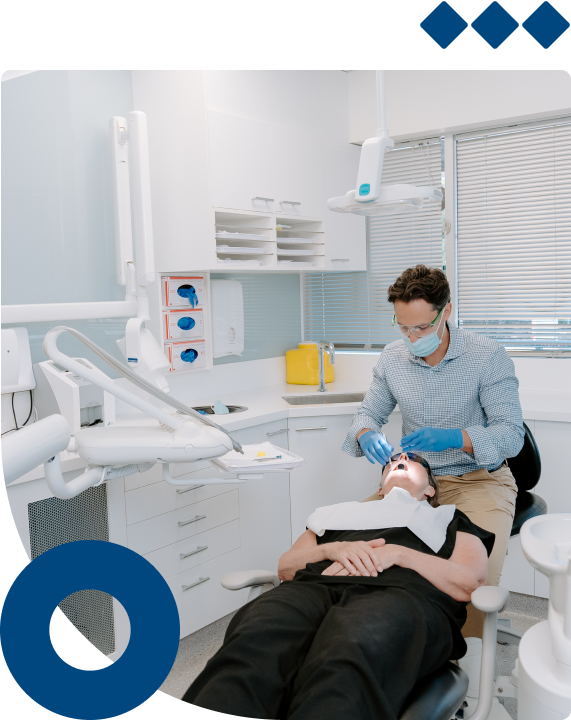Bring Confidence Back With Treatments for Chipped or Broken Teeth
in North Perth
Our modern dental clinic offers quality treatments for chipped or broken teeth in North Perth. We restore your smile’s aesthetics and enhance confidence with every procedure.


Understanding the Dental Health Challenges of Chipped or Broken Teeth
Chipped or broken teeth expose nerves and dentin, significantly increasing pain and risk of tooth infection. Without treatment, they can also lead to tooth decay or dental abscess. Our team counters these risks with treatments like fillings, bonding, crowns, and veneers.
Why Choose Enso Dental
North Perth for Comprehensive Dental Treatments Tailored to Your Unique Needs
Choosing Enso Dental North Perth means entrusting your oral health to a team that is experienced in providing comprehensive, personalised dental care. Find out the unique aspects that set us apart:
Experienced and Skilled Dental Team
Enso Dental North Perth's team of highly skilled dentists and dedicated support staff offers exceptional dental care. This fosters trust in our high-quality treatments and professional service.
Comprehensive Range of Dental Services
We offer a wide array of dental treatments, demonstrating our capability to cater to various dental needs. This makes us a great choice for patients seeking comprehensive dental care under one roof.
Modern Digital Dentistry and Quality Care
Our clinic focuses on modern digital techniques, reflecting our commitment to ongoing advancements in dental care. This approach provides patients with up-to-date, high-quality treatments in a technologically advanced environment.
Our Wide Range of Dental Services Tailored for Chipped or Broken Teeth Restoration
Benefits of Choosing Treatments for Chipped, Broken Teeth at Enso Dental North Perth
Opting for treatments for chipped or broken teeth brings significant benefits, crucial for maintaining oral health and personal well-being, including the following:
- Prevents decay and infection, which is crucial for maintaining long-term oral health and preserving tooth integrity.
- Restores the natural appearance of teeth, enhancing smile aesthetics and boosting confidence.
- Alleviates discomfort and pain from exposed nerves or damaged tooth structures.
- Protects teeth against further wear and damage, preventing complications like tooth loss, misalignment, and severe decay.


Enso Dental North Perth's Right Candidate Criteria for Chipped or Broken Teeth
Our team can assess patients to identify the appropriate treatment approach for their chipped or broken teeth effectively. Considerations include:
- Candidates with tooth damage exposing dentin or pulp, requiring immediate intervention.
- Those suffering acute pain or heightened sensitivity in the affected tooth, which is often a sign of nerve exposure or damage.
- Individuals experiencing significant difficulties in biting or chewing, indicating structural impact from tooth damage.
- Patients who had an accident and are suffering from dental traumatic injuries.
Book Your Appointment Today for a Healthier, Brighter Smile!
Schedule your visit at Enso Dental North Perth today and invest in your oral health for a beautiful, more radiant smile! Discover high-quality dental care that focuses on your complete dental well-being.

Convenient Payment Options
for Your Various Dental Needs
Choose from a variety of flexible payment options to simplify your dental care expenses. We offer diverse methods to align with your financial situation with accessible and affordable dental care.
Frequently Asked Questions
Here, you’ll find information on managing chipped or broken teeth. Discover various treatments for chipped or broken teeth in North Perth. Learn more about recovery and prevention to maintain dental health and appearance.
Chipping or breaking a tooth can be an alarming experience, often causing discomfort and concern. It’s important to address it promptly to prevent further damage and alleviate pain. Such dental emergencies can vary in severity, from minor chips to significant fractures.
If you chip or break a tooth, immediate action can help protect your oral health. Here’s a step-by-step guide on broken or cracked tooth treatment:
- Rinse your mouth:
Gently rinse your mouth with warm water to clean the area. This helps remove any tooth fragments and debris. - Apply a cold compress:
If swelling is present, apply a cold compress to your face near the affected area. This helps reduce swelling and alleviate pain. - Save any pieces:
If possible, collect any broken tooth pieces. Store them in a clean container and bring them to your dental appointment. - Cover sharp edges:
Use sugarless gum or wax paraffin to cover any sharp edges. This prevents injury to your tongue and cheeks. - Avoid certain foods:
Until you see a dentist, avoid hard, crunchy, or hot foods that can aggravate the tooth.- Hard foods like nuts, seeds, and popcorn kernels.
- Crunchy foods such as chips, raw carrots, or apples.
- Sticky foods like caramel or chewing gum.
- Extremely hot or cold foods and beverages that might exacerbate tooth sensitivity.
- Take over-the-counter pain relief:
If you’re experiencing pain, over-the-counter pain medications may be taken. Always follow the instructions and proper dosage. - Consult your dentist promptly:
Book an appointment with your dentist as soon as possible. Quick action is vital for a positive outcome.
Taking these steps after chipping or breaking a tooth can help manage the situation effectively until you receive professional dental care. Remember, addressing dental injuries promptly is key to maintaining your oral health and preventing further complications.
Yes, a chipped or broken tooth can indeed lead to other dental problems if not addressed promptly. When a tooth is damaged, it’s more susceptible to further breakage and decay. The exposed area can become a breeding ground for bacteria, leading to infections. In severe cases, the damage can reach the tooth’s nerve, causing intense pain and sensitivity.
Let’s explore the dental issues that might arise from a chipped or broken tooth:
- Tooth decay and cavities:
A chip can expose the inner layers of your tooth, making it easier for bacteria to accumulate and cause decay. This can lead to cavities, which, without treatment, can result in significant tooth damage and require more extensive treatments. - Infection or abscess:
If bacteria penetrate the tooth’s pulp, it can lead to infection, potentially forming a painful abscess. This condition not only causes severe discomfort but can also lead to more serious health issues if the infection spreads. - Gum disease:
Sharp edges of a broken tooth can irritate and injure surrounding gums, increasing the risk of gum disease. This can lead to swollen and bleeding gums and, in advanced stages, can affect the bone structure supporting your teeth. - Increased sensitivity:
Exposed nerves can lead to heightened sensitivity, especially to hot, cold, or sweet stimuli. This can significantly impact your daily life, making eating and drinking uncomfortable. - Further breakage:
A weakened tooth structure from a chip or break is more prone to further damage under normal chewing forces. This can lead to a more extensively fractured tooth, which might necessitate complex dental procedures like root canal treatment or crown.
Understanding these potential issues highlights the importance of seeking treatment for broken or cracked teeth immediately. Early intervention can prevent these complications and preserve your oral health.
Knowing the right time to seek dental care is crucial when dealing with a chipped or broken tooth. Here’s a guide to help you understand the urgency of dental treatment in such cases.
- Immediately or within 24 hours:
It’s essential to see a dentist as soon as possible, ideally within 24 hours of chipping or breaking your tooth. Quick treatment can prevent further damage and relieve pain. It also allows your dentist to assess the need for additional dental procedures. - In cases of severe breakage or intense pain:
If the break is significant, causing acute pain, or if there’s considerable bleeding, immediate dental care is necessary. This is especially urgent if the broken tooth has sharp edges that could cause injury inside your mouth.
Prompt treatment for a chipped or broken tooth is important for alleviating discomfort and for long-term dental health. Visit your dentist as soon as possible to get the treatment you need.
Restoring a broken tooth is key to maintaining a healthy, confident smile. Advances in dentistry offer several effective methods for this purpose. These broken or cracked tooth treatments not only improve aesthetics but also restore function and prevent further damage.
Several methods are available for restoring a broken tooth:
- Dental Bonding:
This restorative treatment involves applying a tooth-coloured resin to the damaged tooth. The resin is then shaped and hardened with a special light, blending seamlessly with the tooth. Ideal for minor chips and breaks, dental bonding is a quick, cost-effective treatment option that works well for small cosmetic repairs. - Veneers:
Particularly porcelain veneers, these are thin, custom-made shells designed to cover the front surface of teeth. Porcelain veneers are highly valued for their durability and natural appearance, closely mimicking the light-reflecting properties of natural teeth. They are suitable for extensive damage or aesthetic improvements, offering a long-lasting option for teeth with moderately sized defects. - Crowns:
A crown is a tooth-shaped cap that covers the entire damaged tooth. Crowns restore a tooth’s shape, size, strength, and appearance. They are made from a variety of treatment materials, including porcelain, ceramic, or metal, and offer durability. Crowns are suitable for teeth that have sustained significant structural damage or have undergone root canal treatment. - Dental Fillings:
For smaller breaks or chips in teeth, especially on biting surfaces or involving the corners of teeth, dental fillings can be an effective option. The dentist shapes and polishes them to match the tooth, making them a discrete choice for both front and back teeth, particularly when the damage is not extensive enough to require a crown.
Each of these treatments is designed to match the natural colour and shape of your teeth to achieve a uniform look. Your dentist will recommend the appropriate approach based on the extent of your tooth’s damage and your individual needs.
Not all broken teeth can be saved. Factors influencing the salvageability of a broken tooth include the following:
Extent of Damage
- A minimally chipped or cracked tooth often can be restored, and the tooth saved. Treatments like bonding, veneers, or crowns are effective in these cases.
- More severe breaks, especially those extending to the tooth’s pulp or below the gum line, present a greater challenge. In such cases, the possibility of saving the tooth depends on the severity of the break and the health of the remaining tooth structure.
Health of the Tooth and Surrounding Area
- A tooth with a strong root and healthy surrounding bone and gum tissue has a higher chance of being saved.
- Conversely, a tooth with pre-existing conditions like decay or gum disease may be more difficult to save, especially if these issues have weakened the tooth’s structure.
Timeliness and Quality of Dental Care
- Prompt dental care is crucial. The sooner a dentist assesses and manages the broken tooth, the better the chances of saving it.
- The skills of the dental professional and the application of appropriate treatment methods also play a significant role in the tooth’s prognosis.
Here are some limitations and considerations to remember:
- In cases where the tooth is severely fractured, particularly if the root is damaged or the tooth is split into multiple parts, saving the tooth may not be feasible. In such instances, extraction and replacement options like dental implants or bridges are considered.
- If the break has exposed or damaged the tooth’s pulp, root canal therapy may be necessary to save the tooth. This procedure involves removing the damaged pulp, cleaning the inner chambers of the tooth, and sealing it, often followed by a crown for protection.
- Even in cases where the natural tooth cannot be saved, modern dentistry offers several options for restoring both the appearance and functionality of the tooth. These include implants, bridges, and full or partial dentures, which can provide durable and aesthetically pleasing results.
Preventing chipping or breaking your teeth is vital for maintaining good dental health. Teeth can be damaged by various habits and incidents, which are often avoidable. Understanding and adopting preventive measures can significantly reduce the risk of dental injuries.
- Wear a mouthguard:
Especially important in sports, a mouthguard acts as a shield, absorbing shocks and impacts that can break teeth. This is crucial in contact sports like rugby or boxing but also beneficial in activities like skateboarding or mountain biking. - Avoid hard foods:
Biting down on hard foods puts excessive pressure on the tooth, potentially leading to a cracked tooth. It’s wise to avoid eating foods like popcorn kernels, ice, and hard candies, which are common culprits for chipped teeth. - Don’t use teeth as tools:
Using teeth to open packages or bottles can apply uneven force on teeth, risking chips or breaks. To avoid this, use appropriate tools like scissors or bottle openers. - Maintain good oral hygiene:
Strong teeth are less likely to chip or break. Regular brushing with fluoride toothpaste, flossing, and using mouthwash can strengthen enamel, the outer protective layer of your teeth. - Regular dental check-ups:
Regular visits to the dentist allow them to detect dental problems like decay or enamel erosion early. Dentists can also identify and offer approaches for teeth grinding, a common cause of tooth breakage.
Implementing these practices into your daily routine can significantly help protect your teeth from damage. Remember, prevention is always better than cure when it comes to dental health.
Yes, a chipped tooth can indeed cause pain or sensitivity. When a tooth chips, it can expose the dentin or even the pulp, where nerves are located. This exposure can lead to sensitivity to hot, cold, or sweet foods and drinks. If the chip is significant or if it irritates the surrounding tissues, it can also cause discomfort or pain, especially when chewing. A dental check-up can help identify and address such issues before they escalate.
To manage sensitivity and prevent further discomfort, it’s advisable to avoid certain foods and drinks, including:
- Hot beverages:
Such as coffee or tea, which can trigger pain in the exposed area. - Cold drinks:
Like iced water or cold sodas, which can cause a sharp, sensitive reaction. - Sweet foods:
Candies, chocolates, or sugary desserts can aggravate sensitivity. - Acidic foods and drinks:
Citrus fruits, tomatoes, and acidic beverages can increase discomfort. - Hard or crunchy foods:
Nuts, chips, or hard bread can put pressure on the chipped tooth, causing pain. - Sticky foods:
Items like caramel or chewing gum can pull on the tooth and exacerbate pain.
The durability of a chipped tooth treatment varies depending on the type of procedure chosen. The lifespan of each treatment method is influenced by factors such as the extent of the damage, the material used, and individual oral habits. Here’s a breakdown for each treatment:
- Dental Bonding:
Often used for minor chips, dental bonding typically lasts from 3 to 10 years. The lifespan depends on the size of the bonding area and the patient’s oral habits. These habits include biting on hard objects or teeth grinding. Regular check-ups can help extend its longevity. - Veneers:
Porcelain veneers are used for more extensive damage and generally last longer than bonding. They usually last around 10 to 15 years. Veneers are more resistant to staining and chipping compared to bonding. However, their lifespan can be affected by factors like oral hygiene practices and any stress placed on the teeth. - Crowns:
Crowns, which cover the entire tooth, can last anywhere from 5 to 15 years or even longer with proper care. The lifespan depends on the material they’re made from, such as porcelain, ceramic, or metal. It also depends on the patient’s oral care routine, including brushing, flossing, and avoiding hard foods. - Dental Fillings:
Used for smaller chips, dental fillings can last from 5 to 12 years. The longevity is influenced by the material used, such as composite or amalgam. It’s also affected by the location of the filling and the patient’s chewing habits.
Factors affecting the longevity of the repair:
- Material used:
The type of material influences durability. The composite resin used in bonding is less durable than porcelain used in veneers, which offers a longer lifespan. - Location of the chip:
The position of the chip on the tooth (e.g., biting edge, near the gum line) affects the restoration’s longevity. Chips on the biting edges or areas under high stress during chewing are more prone to further damage or wear. - Patient’s oral habits:
Habits like teeth grinding (bruxism) exert excessive force on teeth, potentially damaging the restored tooth. Even habits like nail biting or using teeth as tools can lead to premature wear. - Quality of dental care:
The skills and precision of the dentist play a significant role. High-quality restorative work using the latest techniques tends to last longer and withstand everyday wear better. - Oral hygiene and care:
Consistent oral care routines, including brushing and flossing, help maintain both natural teeth and dental repairs. Avoiding substances that can stain or weaken the repair, like coffee or tobacco, also contributes to longevity. - Follow-up and maintenance:
Regular dental check-ups allow dentists to monitor the condition of the repair. They can make adjustments or recommend maintenance procedures, helping to extend the life of the repair.
Understanding and managing these factors can significantly influence the success and durability of your chipped tooth restoration. It’s important to discuss these aspects with your dentist to gain a clearer picture of what to expect and how to care for your repaired tooth.
At Enso Dental North Perth, the treatment for a chipped tooth begins with understanding the extent of the damage. Our approach focuses on restoring both function and aesthetics while maintaining patient comfort. We tailor our treatments for chipped or broken teeth in North Perth to each patient’s specific needs, considering the chip’s size and location.
Here’s how we address a chipped tooth at Enso Dental North Perth:
- Initial assessment:
The first step of a chipped tooth treatment involves meticulous assessment. We may use X-rays to assess the extent of the damage, checking if it has reached the tooth’s root and nerve. - Discussion of options:
We then discuss various treatment options tailored to the severity and location of the chip. This could range from dental bonding for minor chips to crowns for more significant damage. - Preparation for treatment:
The affected tooth is prepared to receive the restoration. This process includes cleaning the area and potentially making slight adjustments to the tooth’s shape for the treatment. - Treatment application:
Treatment application varies based on the selected method, each requiring precise techniques for optimal results. For bonding, a composite resin is moulded to the tooth and cured with light; for veneers or crowns, a custom-made restoration is carefully positioned and secured in place with dental cement. - Finishing touches:
We meticulously adjust the restoration for a precise fit so it blends seamlessly with your natural teeth, both in shape and colour. - Post-treatment care advice:
We provide detailed advice on how to care for your newly restored tooth, including oral hygiene practices and dietary recommendations, to extend the lifespan of the restoration.
At Enso Dental North Perth, we have a dedicated approach to restoring chipped teeth that are designed to meet each patient’s unique needs. We’re committed to restoring your smile’s health and aesthetics with a high level of care.
The recovery time after chipped or broken tooth treatment varies depending on the procedure used. Generally, less invasive treatments like dental bonding have shorter recovery times, often just a few hours to a day. More complex procedures like veneers or crowns may require a longer period, potentially a few days to a week.
Here is a breakdown of different treatments and their recovery times:
- Dental Bonding:
Ideal for minor chips, dental bonding offers a quick recovery, typically within 2 to 4 hours. This quick turnaround is due to the procedure’s minimal invasiveness and the rapid setting of the bonding material. - Veneers:
Used for visible chips, veneers require about 2 to 5 days for adjustment. This period allows the gums and teeth to adapt to the new restoration. - Crowns:
Suitable for extensive damage, crowns typically have a recovery period of about 5 to 7 days. This time frame allows for the gums and teeth to adapt to the new crown and for the patient to get used to the bite. - Dental Fillings:
Suited for small to moderately-sized chips, dental fillings involve a short recovery period, similar to bonding. Patients can expect a recovery time of about 2 to 4 hours, depending on the extent of the filling and the material used.
Each treatment option for chipped or broken teeth has its specific recovery timeline. Our commitment is to guide you through this recovery process, focusing on your comfort and the restoration of your dental health.

Experience the Enso Dental North Perth Difference; Schedule Your Visit Today!
Discover exceptional dental care with your trusted dentist in North Perth. Your journey to a healthier smile starts when you book your appointment!